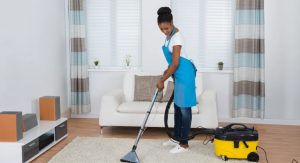Table of Contents
ToggleThe cleaning industry in the UK plays a critical role in maintaining homes, offices, and public spaces. With more people opting for self-employed cleaners over agencies, it’s important to understand how hourly rates are determined.
This comprehensive guide explores everything you need to know about self-employed cleaner hourly rates in the UK. From regional variations to setting competitive rates, we’ll cover the key factors that impact this essential service.
What Are the Current Trends in the Self-Employed Cleaning Industry in the UK?

The self-employed cleaning industry is on the rise, driven by the flexibility and affordability it offers clients.
Key Trends Shaping the Industry
- Increasing Demand:
The demand for self-employed cleaners has grown significantly, particularly in urban areas where people often lead busier lives. - Technology Integration:
Many cleaners now use online platforms like TaskRabbit and Bark to find clients, making it easier to build their business. - Sustainability Focus:
More clients are requesting eco-friendly cleaning products and methods, which can allow cleaners to charge premium rates. - Diverse Clientele:
Clients range from single professionals and families to landlords needing end-of-tenancy cleaning business.
How Much Do Self-Employed Cleaners Earn Per Hour in the UK?
The earnings of self-employed cleaners in the UK depend on various factors, including the type of cleaning service, region, and experience. On average, hourly rates range from £12 to £20, but specific services or circumstances can push these rates higher.
Earnings Breakdown by Cleaning Service
Here’s a table summarising the typical hourly earnings across different types of cleaning services:
| Cleaning Service | Average Hourly Rate (£) | Details |
| Domestic Cleaning | 12–15 | Routine cleaning tasks such as vacuuming, dusting, and mopping. Ideal for regular household upkeep. |
| Deep Cleaning | 20–25 | More intensive cleaning, often involving tasks like carpet shampooing, oven cleaning, and tackling grime. |
| End-of-Tenancy Cleaning | 25–30 | A comprehensive clean to meet landlord or agent requirements before new tenants move in. |
| Eco-Friendly Cleaning | 20–30 | Specialised cleaning using environmentally friendly products, appealing to eco-conscious clients. |
| Post-Construction Cleaning | 25–35 | Clearing debris, dust, and stains from construction or renovation work. |
| Commercial Cleaning | 15–25 | Cleaning offices, retail spaces, or other business premises, often requiring flexible hours. |
Earning Potential Based on Service Combination
Self-employed cleaners who diversify their services, such as combining domestic cleaning with occasional end-of-tenancy or eco-friendly cleaning, can significantly boost their income. By catering to various client needs, they can charge a mix of standard and premium rates.
What Factors Affect Hourly Rates for Cleaners?

Numerous factors impact the hourly rates self-employed cleaners can charge. Understanding these elements is critical for cleaners to set rates competitively while ensuring profitability.
1. Location and Cost of Living
- Urban centres such as London or Manchester have higher rates, reflecting higher living and operational costs.
- In rural areas, cleaners often charge less to stay competitive due to lower demand.
2. Type of Cleaning Service Provided
- Routine Cleaning: Tasks like sweeping and dusting generally have lower rates.
- Specialised Cleaning: Services such as oven cleaning, carpet shampooing, or window cleaning demand higher rates due to their complexity and effort.
- End-of-Tenancy Cleaning: A highly sought-after service requiring a deeper, more comprehensive clean often justifies a higher price.
3. Experience and Reputation
Experienced cleaners with positive reviews or referrals can charge higher rates. Building a strong portfolio or gaining certifications in specialised cleaning (e.g., eco-friendly products) also boosts earning potential.
4. Frequency of Service
- One-Off Jobs: These typically come at a premium due to their sporadic nature.
- Regular Contracts: Cleaners might offer discounted rates for recurring work to build a steady income stream.
5. Supplies and Equipment
Cleaners who provide their own equipment and cleaning supplies often incorporate these costs into their rates. Offering premium or eco-friendly products may also justify higher charges.
How Do Cleaner Rates Vary Across Different Regions in the UK?
Cleaner rates across the UK are influenced by regional factors such as cost of living, demand for services, and competition. Urban areas like London tend to have the highest rates, while rural areas generally see lower charges due to differences in market demand.
Regional Hourly Rates Comparison
| Region | Hourly Rate (£) | Details |
| London | 15–30 | Highest rates due to high demand, cost of living, and availability of premium services. |
| South East England | 15–25 | Slightly lower than London but still high due to affluence and demand in urban centres like Brighton. |
| Midlands | 12–20 | Balanced rates reflecting moderate demand and cost of living in cities like Birmingham. |
| North West England | 10–15 | Lower rates typical in less urbanised areas; however, cities like Manchester see higher rates. |
| Scotland | 10–15 | Rural areas offer lower rates; major cities like Edinburgh and Glasgow charge closer to £15/hr. |
| Wales | 10–14 | Predominantly rural, with affordable rates; Cardiff and Swansea tend to be exceptions. |
Tips for Setting Rates Based on Location:
- Understand Local Market Dynamics: Research competitor rates in your area to stay competitive.
- Target Affluent Areas: If feasible, focus on urban or affluent suburbs where clients are willing to pay higher rates.
- Offer Travel Flexibility: In rural areas, being willing to travel to nearby towns can help secure higher-paying jobs.
How Can Self-Employed Cleaners Set Competitive Rates?

To attract clients while ensuring profitability, self-employed cleaners should consider these strategies:
1. Conduct Market Research
- Analyse local competitors to understand average pricing in your area.
- Join cleaner networks or forums to stay updated on industry trends.
2. Highlight Your Unique Selling Proposition (USP)
- Offer niche services, such as eco-friendly cleaning or allergy-free products.
- Provide flexible scheduling to meet client needs.
3. Factor in Operational Costs
- Include expenses like cleaning supplies, transportation, insurance, and marketing.
- Build a pricing structure that covers your costs while leaving room for profit.
4. Use Online Platforms to Attract Clients
- Platforms like TaskRabbit or Bark can help you reach new clients quickly.
- Display testimonials and reviews prominently to build trust.
5. Build Long-Term Relationships with Clients
- Offer discounts for regular or long-term contracts.
- Encourage referrals by providing small incentives, such as discounted rates for referred clients.
What Should Landlords and Tenants Know About Budgeting for Cleaning Services?
Both landlords and tenants can benefit from hiring self-employed cleaners, but budgeting is essential to avoid surprises.
Average Costs by Service:
- Routine Cleaning: £12–£20 per hour for regular domestic tasks.
- Deep Cleaning: £20–£30 per hour for more intensive jobs.
- End-of-Tenancy Cleaning: £25–£35 per hour, depending on property size.
Understand the Scope of Work:
- Be clear about the tasks required (e.g., carpet cleaning, upholstery care).
- Specify additional requirements such as the use of eco-friendly products or cleaning supplies provided by the cleaner.
Get a Detailed Quote:
- Request an itemised quote to avoid hidden charges.
- Ask whether transportation or material costs are included in the rate.
Plan for Contingencies:
- For end-of-tenancy cleaning, budget extra for unforeseen requirements, such as removing stubborn stains or repairing minor damages.
What Are the Benefits of Hiring a Self-Employed Cleaner?
Hiring a self-employed cleaner comes with several advantages for clients, whether they’re homeowners, tenants, or landlords. Unlike agency cleaners, self-employed professionals often provide a more personalised and cost-effective service.
Cost-Effectiveness
- Lower Rates: Self-employed cleaners typically charge less than agency-employed cleaners as there are no agency fees involved. This makes them a more affordable choice for both regular and one-off cleaning tasks.
- Negotiable Rates: Many self-employed cleaners are open to discussing and customising pricing based on specific client needs, such as long-term contracts or occasional deep cleaning jobs.
Flexibility and Customisation
- Bespoke Services: Clients can request tailored cleaning services, whether it’s focusing on specific areas like the kitchen or handling unique requirements such as eco-friendly cleaning products.
- Adjustable Schedules: Self-employed cleaners offer more flexibility in scheduling, often accommodating evening or weekend cleanings that agencies might not.
Direct Communication
- Clear Expectations: Clients communicate directly with the cleaner, avoiding potential misunderstandings that can arise when working through an agency.
- Immediate Feedback: Any adjustments to the service can be made on the spot, leading to better satisfaction for both parties.
Long-Term Relationship Building
- Consistency in Service: Building a relationship with a regular cleaner ensures consistent quality and reliability, as opposed to agency cleaners who may rotate staff.
- Trust and Familiarity: Regular clients and cleaners often establish a strong rapport, making the experience more comfortable and seamless.
Supporting Local Businesses
- Hiring self-employed cleaners directly supports local and small businesses, contributing to the community’s economic growth. Clients often feel good about helping individuals rather than large corporations.
What Are the Challenges Faced by Self-Employed Cleaners in the UK?

While being self-employed offers flexibility and independence, it also comes with unique challenges that cleaners must navigate to sustain their business and income.
Income Instability
- Fluctuating Demand: Work availability can vary based on the season, location, or economic conditions. For instance, cleaners might face reduced demand during holiday periods when clients are away.
- Inconsistent Payments: Some clients may delay payments, affecting cash flow and making it difficult to manage expenses.
Competition from Agencies
- Pricing Pressure: Agencies often offer competitive pricing backed by a larger workforce and resources, making it harder for self-employed cleaners to compete.
- Market Saturation: In urban areas, self-employed cleaners face stiff competition from both other independents and established cleaning companies.
Administrative Burden
- Managing Taxes and Finances: Self-employed cleaners must handle their own tax filings, which can be complex without proper knowledge or tools. This includes tracking income, expenses, and deductions.
- Time Management: Beyond cleaning, tasks like invoicing, scheduling, and marketing take up significant time.
Handling Overheads
- Supplies and Equipment: Cleaners need to purchase and maintain their own tools and cleaning products, which can be costly. Offering premium or eco-friendly supplies further increases expenses.
- Transportation Costs: Travelling between clients, especially in rural areas or for one-off jobs, adds to overheads like fuel and vehicle maintenance.
Building a Client Base
- Marketing Challenges: Without the backing of an agency, self-employed cleaners must actively promote their services through platforms like social media, online directories, or word of mouth.
- Reliance on Reviews: Positive reviews are essential for attracting new clients, making every job critical to their reputation.
Physical Demands of the Job
- Strain and Fatigue: Cleaning is physically demanding, involving repetitive motions, heavy lifting, and prolonged periods of standing or bending.
- Health Risks: Exposure to chemicals or allergens and the risk of injury from tasks like moving furniture can impact long-term health.
Limited Legal and Insurance Protections
- No Sick Pay or Benefits: Unlike agency employees, self-employed cleaners don’t receive sick pay, holiday pay, or other employment benefits.
- Insurance Requirements: They must purchase their own liability insurance to protect against potential damages or accidents during work.
Adapting to Market Trends
- Specialised Demands: As clients increasingly request services like eco-friendly cleaning or post-construction cleanup, self-employed cleaners must continually adapt and invest in new skills or equipment.
- Keeping Up with Technology: Platforms like TaskRabbit and apps for scheduling or invoicing are becoming essential tools for competing in the modern market.
Conclusion
Understanding the hourly rates and dynamics of self-employed cleaners in the UK is crucial for both cleaners and clients. For cleaners, setting competitive yet profitable rates involves considering factors such as location, service type, and experience. Meanwhile, clients benefit from hiring self-employed professionals through cost-effective, flexible, and personalised services.
Despite the challenges, self-employed cleaners continue to thrive by adapting to market trends, building strong client relationships, and offering specialised services. By addressing issues like fluctuating income, administrative tasks, and competition, they can establish successful, sustainable businesses.
For clients, hiring a self-employed cleaner is not just about affordability but also about building trust and supporting local businesses. Whether you’re a tenant seeking an end-of-tenancy clean or a homeowner looking for regular domestic help, self-employed cleaners provide invaluable services tailored to individual needs.
Ultimately, fostering transparent communication, setting clear expectations, and prioritising quality will lead to a mutually beneficial arrangement for both cleaners and clients across the UK.
FAQ
What is the average hourly rate for a cleaner in the UK?
Self-employed cleaners typically charge £12–£20 per hour, with higher rates in urban areas.
What services affect cleaning rates?
Services like deep cleaning, eco-friendly cleaning, and end-of-tenancy jobs usually cost more due to their specialised nature.
How can self-employed cleaners market their services?
Cleaners can use online platforms, local directories, and social media to reach potential clients.
Do cleaners provide their own supplies?
Many self-employed cleaners offer this option, but clients should confirm during booking.
How can landlords ensure reliable cleaning services?
By checking reviews and hiring cleaners with experience in end-of-tenancy work.
Are rates higher for evening or weekend cleaning?
Yes, many cleaners charge premium rates for out-of-hours or weekend services.
What should clients ask before hiring a cleaner?
Clients should inquire about the cleaner’s experience, insurance, and service guarantees.




